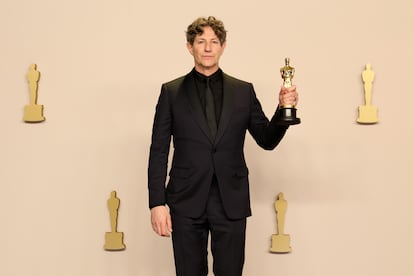Jonathan Glazer, the Jewish director of ‘The Zone of Interest’ who dared to call out Israel at the Oscars
Jewish groups in the U.S. and Israeli officials criticize the British filmmaker’s strong statement


“All our choices were made to reflect and confront us in the present, not to say, ‘Look what they did then.’ Rather, ‘what we do now.’ Our film shows where dehumanization leads at its worst.” That’s how Jonathan Glazer started his speech after winning the Oscar for Best International Feature Film for The Zone of Interest, a drama set in the Auschwitz extermination camp during World War II. “Right now, we stand here as men who refute their Jewishness and the Holocaust being hijacked by an occupation which has led to conflict for so many innocent people,” Glazer continued. “Whether the victims of October 7 in Israel or the ongoing attack on Gaza, all the victims of this dehumanization — how do we resist?” One of the prominent music video directors of the 1990s and director of four cult films, Glazer skillfully depicted the horror of Nazi extermination camps without showing any victims. His Oscar acceptance speech solidified his position as a unique creator with a distinctive voice, fearless and unwilling to self-censor.
His speech got lukewarm applause at the Dolby Theater, confirming a peculiarity of his character: Glazer has no interest in currying favor with anyone. The response outside Los Angeles has been anything but calm. In Israel, the speech went almost unnoticed. One of the few to respond was Amichai Chikli, an Israeli politician who serves as the Minister of Diaspora Affairs and the Minister for Social Equality. Glazer was the “next useful idiot who stuck a knife in the back of his people,” Chikli posted on X. “There is no forgiving such vile types — auto-antisemitic Jews.” Danny Danon, a legislator from Prime Minister Benjamin Netanyahu’s Likud Party said, “This is an important film. It’s a shame that a Jewish director took advantage of the stage that he was given to make antisemitic remarks comparing the Holocaust to the war of no-choice that was forced upon us.”
Most criticism of Glazer’s speech came from U.S.-based Jewish organizations, not Israeli politicians. The Anti-Defamation League said that Israel defending itself does not equate to hijacking Judaism or the Holocaust, labeling the speech as “factually incorrect and morally reprehensible.” The World Jewish Congress deemed it “an affront to the memory of Holocaust survivors.”

Amid all of the commotion, the final part of Glazer’s speech was overlooked. He dedicated the Oscar to an elderly Polish woman named Aleksandra Bystroń-Kołodziejczyk, whom he met before filming near the Auschwitz camp. She had been part of the resistance at just 12 years old and sadly died a few weeks after meeting Glazer. The team filmed at her house near the prison camp walls, where she used to leave apples for the prisoners. Bystroń-Kołodziejczyk’s bicycle and dresses are featured in The Zone of Interest in a night scene of a girl hiding food for the prisoners.
10 years of development
Glazer spent nearly a decade developing The Zone of Interest, a loose adaptation of Martin Amis’ novel of the same name. Amis saw the finished film before he died on the day of its Cannes release, where it won the Grand Prix award. In an interview with EL PAÍS at the San Sebastián International Film Festival months later, Glazer shared his vivid childhood memories of the images of the vandalism and violence of Kristallnacht. This led him to seek a new perspective on historical events not previously explored on screen.
In 2014, Glazer read a review of Amis’ novel and without reading the book, asked producer James Wilson to buy the film rights. Wilson has been vocal in denouncing the “selective sympathy” of this year’s awards season. “The commander character he [Amis] created is fictional, but I went on a long journey researching real people for the film,” said Glazer. That’s why the film features the authentic names of the protagonists: Auschwitz commander Rudolf Höss and his wife, Hedwig.

“Let’s be honest. Nobody is born a mass murderer, but it’s the gradual progression of passivity and the desire for acceptance that leads them down that path. And this is still happening today,” said Glazer in our interview last September. His words became even more relevant after October 7 when war broke out in Gaza. The filmmaker recalls a conversation with his father. “In my house, we never really talked about the Holocaust, even though it was always there,” said Glazer. “My family moved to the U.K. from Ukraine and Bessarabia after the 1903 pogrom. When my father found out that I was doing this project, he told me, ‘I don’t know why you’re doing this. Let it rot.’ And those three words [let it rot] provoked a quick response from me: ‘I really wish it would rot, but all this didn’t just happen in the past.’”

Glazer attended a Jewish school in Camden, the London neighborhood where he grew up and still lives. His family followed Reform Judaism. As a youth, Glazer participated in the Givat Washington program, and spent five months in its religious youth village in central Israel. After studying theater design at the University of Nottingham, he ventured into directing trailers. By 1993, his three short films opened doors in advertising and music videos. Winning the 1997 MTV award for best music video director, Glazer made his mark with videos for Radiohead, Nick Cave, Jamiroquai, Blur and Massive Attack, inspiring him to pursue cinema, a passion passed down from his father.
An admirer of Stanley Kubrick, Glazer has only directed four feature films: Sexy Beast (2003), a brutal gangster film filmed partly in Spain with Ben Kingsley and Ray Winstone; Birth (2004), a film where Nicole Kidman discovers the soul of her dead husband in a child; Under The Skin (2014), with Scarlett Johansson playing a ruthless alien, and The Zone of Interest, which just won two Oscars (Best International Feature Film and Best Sound). Glazer first recorded the actors portraying the daily lives of the Höss family, and added the agonizing sounds of the Nazi extermination camp later to avoid influencing the actors’ performances.
“I didn’t want to create an aloof museum piece, disconnected from the audience,” Glazer said in our interview last September. “We mustn’t forget humanity’s incredible capacity for committing aberrant crimes, whether actively or passively. It’s dangerously easy to go down that path.” His Oscars’ acceptance speech perfectly aligns with those words.
Sign up for our weekly newsletter to get more English-language news coverage from EL PAÍS USA Edition
Tu suscripción se está usando en otro dispositivo
¿Quieres añadir otro usuario a tu suscripción?
Si continúas leyendo en este dispositivo, no se podrá leer en el otro.
FlechaTu suscripción se está usando en otro dispositivo y solo puedes acceder a EL PAÍS desde un dispositivo a la vez.
Si quieres compartir tu cuenta, cambia tu suscripción a la modalidad Premium, así podrás añadir otro usuario. Cada uno accederá con su propia cuenta de email, lo que os permitirá personalizar vuestra experiencia en EL PAÍS.
¿Tienes una suscripción de empresa? Accede aquí para contratar más cuentas.
En el caso de no saber quién está usando tu cuenta, te recomendamos cambiar tu contraseña aquí.
Si decides continuar compartiendo tu cuenta, este mensaje se mostrará en tu dispositivo y en el de la otra persona que está usando tu cuenta de forma indefinida, afectando a tu experiencia de lectura. Puedes consultar aquí los términos y condiciones de la suscripción digital.








































